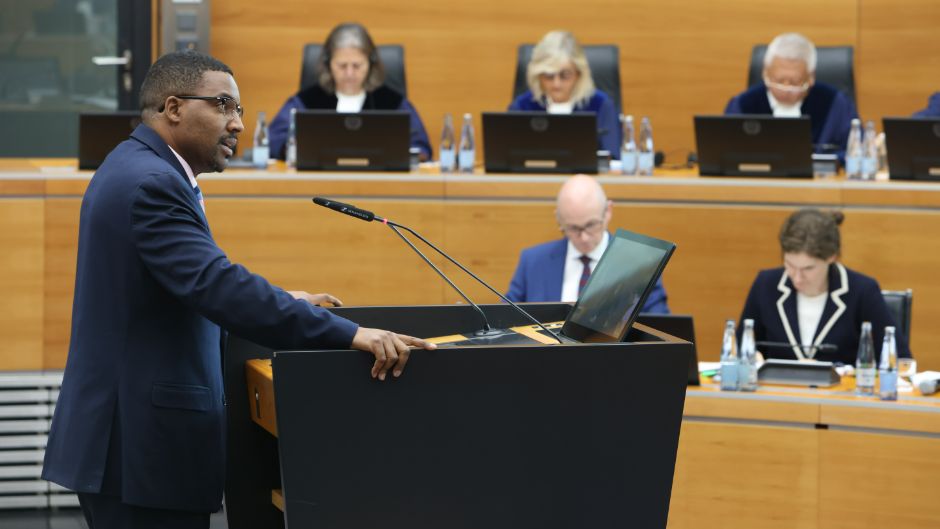Joining the University of Miami School of Law finds Charles C. Jalloh in yet another place. The expert in many aspects of international law—from criminal to trade—has traveled the globe academically and professionally.
Before academia, Jalloh served in roles such as counsel for the Canadian Department of Justice, associate legal officer at the United Nations International Criminal Tribunal for Rwanda, and legal adviser/duty counsel for the Special Court for Sierra Leone. He has also advised governments and international organizations on international law issues. He has been involved in cases at international courts such as the International Criminal Court, the International Tribunal for the Law of the Sea, and the International Court of Justice.
Jalloh's path to study, practice, and teach law began in his native county of Sierra Leone, which he fled as a teenager to escape civil unrest and unrelenting civil wars. Before the strife (on which the movie Blood Diamonds is based), the middle child of nine of his mother's children had an idyllic life in a lush agricultural area in the northern part of the country.
"I spent a lot of time in the local library," he said. "I read everything from mysteries to the Hardy Boys and Nancy Drew and I loved books on geography. In a sense, I attribute that time to what became my love for law and education and studying and learning."
After finishing high school, the war got very bad, and he left his home and his family for Canada, where he had the good fortune of having his father's brother and a sister in Toronto.
"When I was younger, I had a fascination with ships and planes and imagined I would be a pilot," he said. "But when the war broke out, and I left Sierra Leone, I was determined to become a lawyer. I didn't realize back then how complicated what I was thinking would be. But I had a very vague sense that what was going on in my country was wrong and that people who were responsible for what was happening at the time should be prosecuted.
"When I left, I realized it was not a unique story. There are lots of countries in Africa, but also other parts of the world that had fallen into conflict," he said. "And sadly, if you fast forward to today, we witness similar realities. And so, the sense was, I wanted to go to law school, to be a part of that effort to have accountability."
Jalloh says that he was very privileged professionally to have had the chance to go back to Sierra Leone as a qualified lawyer to work at the Tribunal and contribute to the accountability process, especially when he left "basically as a kid with barely a high school diploma."
"I had envisioned myself coming back and being part of the prosecution team, but instead got a job as a legal advisor in the Defense Office," he said, "which is the other side of the issue in terms of accountability. But yet also something that I very much appreciated that I got a chance to do, because I then was able to think about accountability, the presumption of innocence and the right to a fundamental aspect of a justice process in a much more complex way."
Soon after, Jalloh joined the legal team assisting the judges on the United Nations tribunal, prosecuting the architects of the atrocity crimes in Rwanda. "As legal officers, our job was to assist the judges in piecing together the evidence and writing the drafts that essentially became the judgment," he said.
Jalloh has also served on the International Law Commission of the United Nations. "This is like a dream come true for any international lawyer," he said. "When you think about the totality of the commission in its 75-year history, only 267 international lawyers have had the privilege of serving there. You have to be nominated by and elected by States."
Jalloh said that the goal of the Commission is to assist the States with the codification and progressive development of international law on the premise that when you have a rules-based system, countries are less likely to go to war with each other, so the idea of international rules that States agree to is a way to smooth the engine of international relations.
"It allows a more equitable balance between the most powerful States and the least powerful States with a rules-based system that presumes equality of each State before the law," he said. "That has been the biggest privilege I've had in a very privileged career."
Jalloh was drawn to the law school by the "fantastic faculty and programs in international law," he said. "The law school is very deep and wide in terms of programs offered and faculty involvement across the field both on the public and private international law side. And, obviously, UM is a huge research-oriented university located right here in Miami that opens up very much to all of Latin America and the Caribbean."

